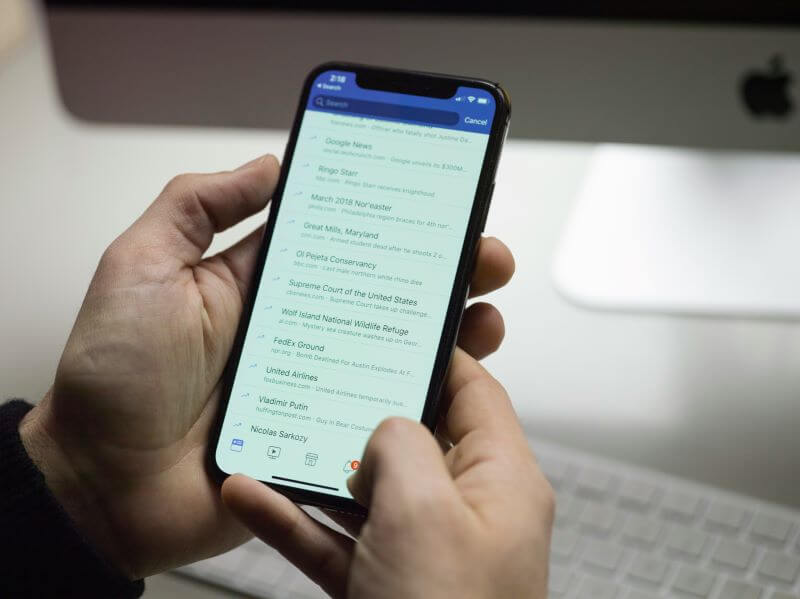Both mentally and physically, teenagers go through a lot of changes. Parents should be very careful about what they say to their kids because teens take what adults say literally.
It is known from statistics that many teens leave their homes because their parents' careless words have hurt them. Also, kids this age are more likely to have suicidal ideas. Experts say this behavior can happen when teens feel they are not wanted by their family or parents or understand them.
It's important to remember that some things you use most often may hurt your kids the most. This page lists ten things you should never say to your teenager. Read on to see if you've done the same things wrong.
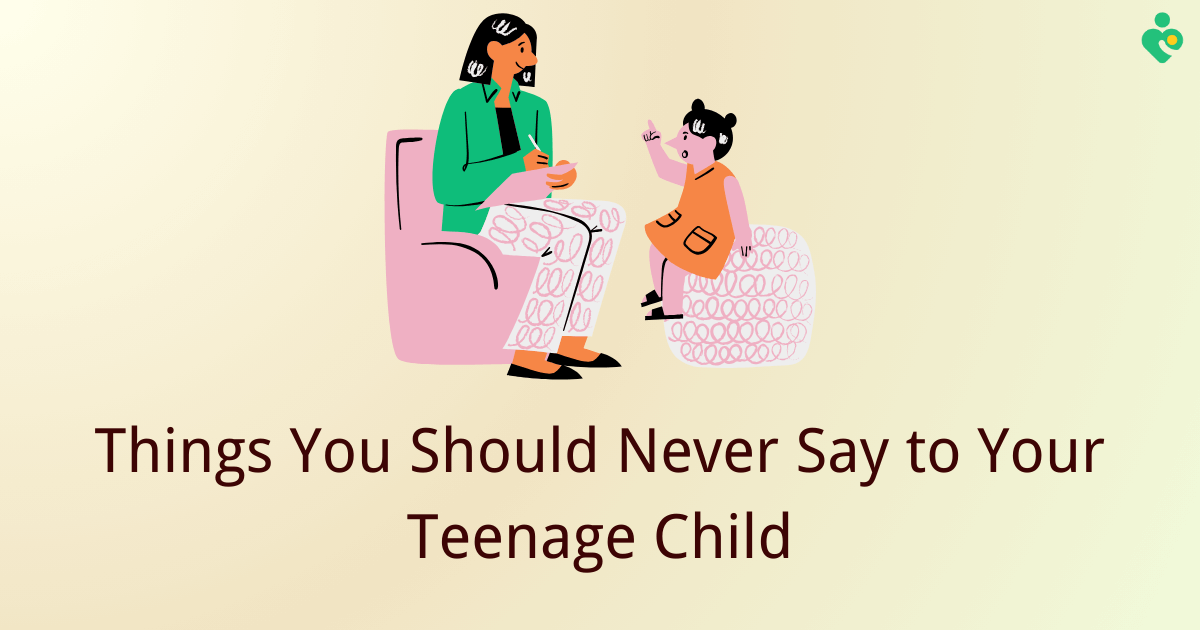
Table of Contents
Part 1: 10 Things You Should Never Say to Your Teenage Child
When adults unintentionally insult their children, it is not because they mean any harm. When children exhibit hostile behavior, develop harmful habits, or show signs of introversion, their parents try to appeal to common sense.
Teens' thoughts and feelings make sense in the context of their lives, so parents need to understand that they are not completely mad or crazy.
How can family members keep the peace and their relationships warm and friendly? Parents must learn what words and sentences they should never use around teens. Here are ten things you should never say to your teenage child.
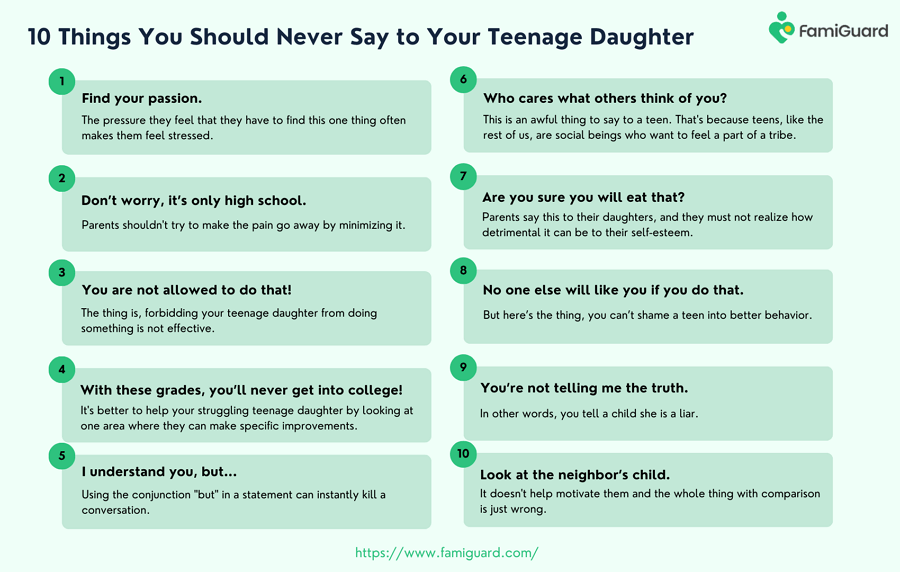
Find your passion.
People may believe they are loving and helpful when telling their teen daughter, "Find your passion." Teenagers still finding out who they are might find this order scary.
Why Should Never Say:
Teenage daughters think they must find one thing they will love doing for the rest of their lives. This makes them feel stressed, lost, and sometimes even paralyzed, fearing they will choose the wrong job. Most people have never found something interesting.
What To Do Instead:
Teens should instead be told to follow their "fascinations" and hobbies. They will know what they want to do with their lives after this. Their journey will have many stops and parts, but it will still be very satisfying. So, as parents, you only need to say: "Just do what you love to do!"
Don't worry, it's only high school.
Parents should not try to make their daughter's suffering go away by trying to minimize it, even though it is difficult to watch your daughter suffer from a lousy grade, a social rejection, or a split in a romantic relationship.
Why Should Never Say:
When it comes to children, those occurrences are significant to them at present. The years spent in high school are filled with many firsts, including first loves, first experiences with failure, first tears, and more.
What To Do Instead:
Listening is the best option. In addition, by uttering a phrase such as "It gets better," you demonstrate that you recognize the extent of their emotions and assure them that the difficult times will get better.
You are not allowed to do that!
I get why you want to do this—you're scared that your child will get hurt, maybe in a big way that you can't fix. Because you are afraid, you tell them they can't do that, like going on a date, party, dance, etc. The thing is, telling your young daughter she can't do something won't work.
Why Should Never Say:
Two things are going on here. First, telling someone, "I forbid you!" doesn't make them do what you want. It doesn't make kids follow the rules; instead, it makes them sneaky and rebellious, like trying to get away with whatever they want, even if you don't want them to. Second, it takes away your chance to teach and support your child's growth.
What To Do Instead:
What else could you do? To get to the heart of your worries, say, "I'm not sure if this party is safe for you." Before discussing whether you can go, I need to see your following. Please let me know the names of the parents who will be there and who is in charge.
How could that change what happens? You haven't given your OK. You haven't let your kid do something you don't like. If you decide to take a chance and let your child go to the party, you'll have the opportunity to help them practice following the rules and show you that they can do it, making you feel better about their ability to handle risks safely.
With these grades, you'll never get into college!
Parents say things that sound bad if their teens are having trouble in school or don't follow the usual success tracks. They don't want to say anything wrong about their child.
Why Should Never Say:
When your child gets bad grades, don’t rush to deny her. This may hurt your child’s self-esteem and motivation to learn. Motivation plays a vital role in achieving good grades.
What To Do Instead:
You can better help your young daughter if you focus on one area where she can make specific changes rather than setting her sights on college or something else far away as the end goal. You could say, "Hey, I see you're having trouble staying on track with your studies. It would be best if you worked on that right now so it will help you for the rest of your life."
I understand you, but...
Adding the word "but" to a sentence can immediately end a talk.
Why Should Never Say:
It throws out the first part of the sentence and lets your teen know that you don't care how she feels about wanting to drop the economics or law class you think is essential for her college applications.
What To Do Instead:
Changing "but" to "and" in a sentence can show that you want to hear your teen's point of view and help you find answers that work for both of you: "I understand how you feel, and I'd like to understand what's going on with your economic class."
The amount of work your daughter has to do might make her say that she's stressed out and is wondering if she wants to go to the chosen college you want her to attend. We suggest that she talk to her guidance counselor about her choices. It's now possible to compromise.
Who cares what others think of you?
You should not say this to a kid. Like the rest of us, teens like to be around others and feel like they belong to a group.
Why Should Never Say:
Of course, they can't live their lives thinking that what other people think is essential. Teens should learn how to choose who and why their opinions count.
What To Do Instead:
The only way to escape being judged is to accept that it's impossible. To get along with other people, we must judge them, for better or worse. To help your teen daughter understand this, you could tell her, "Get ready for people to have their opinions."
Reminding your kids in their minds that other people will have opinions about them, even if some are wrong, can help them deal with criticism. Since perfection is impossible, it's pointless to try to achieve it. Judging someone for not being perfect is pointless, unfair, and unhelpful.
Are you sure you will eat that?
People who say this to their teenage daughters don't seem to understand how damaging it is to the teens' self-esteem.
Why Should Never Say:
Teenage girls are very focused on their weight and how they look. Some also interpret this statement as an attack on their appearance or claiming they lack character.
A study also found that eating issues are prevalent among teenage girls and are becoming more common among young men as well. The people they talk to know that you think they're gross or fat.
What To Do Instead:
Regarding food, parents should stay out of their kids' lives because, most of the time, kids figure things out on their own, especially if they live in a home where everyone eats healthy, balanced meals.
No one else will like you if you do that.
It's really simple to say, right? Your kid wants to fit in; you know that. Your kid wants people to like them, you know that. You may even be afraid that your child won't be liked if they are rude or argumentative or color their hair that color.
Why Should Never Say:
But here's the thing: teens can't be shamed into being better. It does not work for anyone. For this reason, shame makes your kids feel bad about themselves and like they're not worth anything. Your teen will probably pull away in shame.
This is not about what is right or wrong; it's about what works. Shaming someone is also not an excellent way to get them to change their behavior.
What To Do Instead:
Helping your child know that they are enough is something that every parent can do for them. They deserve it because they are a people on.
Someone is valuable even if they aren't successful or behave well. People are valuable just the way they are - something true, like the ground under our feet or how hot it is in the summer. Every person has worth.
You're not telling me the truth.
That is, you tell a kid she's lying. You question the child, and they answer. You don't believe them, and you don't try to hide how you feel. "Are you sure you went to school?" Will they tell me the same thing if I call and ask?" These words are bad for your teen.
Why Should Never Say:
It's very annoying when someone doesn't believe you. At some point, the child will lie because she knows that if you don't believe her, why tell the truth? Kids won't say to the fact if you doubt them. The opposite is true.
There are a lot more profound and complicated reasons why teens lie. Teenagers who don't feel good about themselves may lie to make other people think they are better than they are.
What To Do Instead:
Tell your kid to take a breath before they talk. Before they answer any question, teach them to count to three and use that time to think of a truthful answer. Also, always believe in your teenage daughter and be her backup!
Look at the neighbor's child.
This could be a family friend's child or the son of an aunt. Either way, there's no reason to compare them.
Why Should Never Say:
The comparison doesn't help them get going and needs to be corrected. A comparison is something disappointing, annoying, and sad. You shouldn't compare your kids to others because they are just how they are.
A kid should measure her progress by how well she does in school, not by how well her friends do. Comparing your child to others can hurt your teen's growth and improvement. Low self-esteem is another problem kids face, and the relationship between parents and children may be ruined.
Teenagers' needs should be considered rather than blamed when they do poorly. Being thoughtful, kind, and aware of a teen's needs is part of nurturing them.
What To Do Instead:
Being a good parent means holding their hand through hard times and letting them go when they find their way. Being a safe place for them would mean that you listen to them and believe every fear they have.
Part 2: How to Know Your Kids' Online Activities Better?
If you have a teenage girl, you should be aware of things you should never say to your child and watch what she does online. It's normal and understandable for parents to want to keep their kids, especially teens, safe from the dangers in the world.
Sometimes, parents are too busy with work to keep an eye on their kids all the time. Your kids will almost certainly break your rules as soon as you're not around, even if you write them down and ensure they follow them.
That means you can't do anything to keep your young daughter safe, right? Yes, you can! A good app for parental control will save the day.
There are many parental control apps out there for parents to choose from. Every single one of them has its pros and cons. Parents have a hard time picking the best one for their kids. Here, we would like to recommend FamiGuard Pro to you.
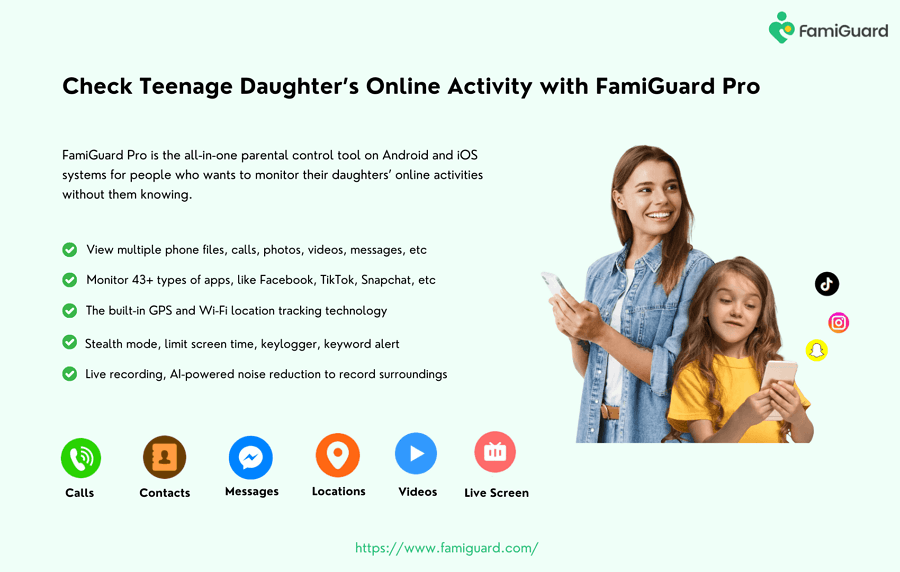
FamiGuard Pro is the all-in-one parental control tool on Android and iOS for people who want to monitor their kids' online activities without knowing.
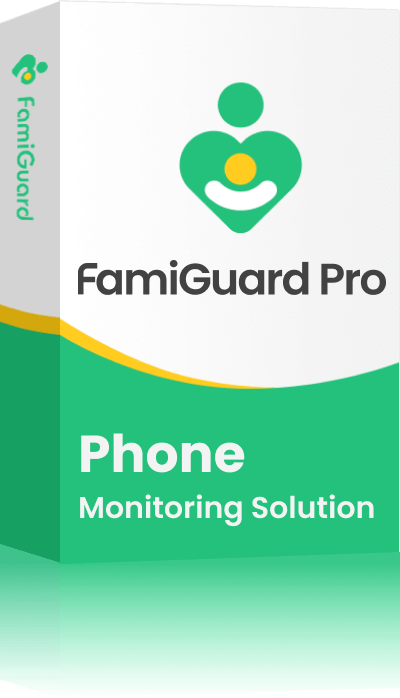
What Can FamiGuard Pro Do?
-
Screen time report: FamiGuard Pro offers a set of functions that let you know how much time they spend on their devices, what your children do on their phones, what apps they use, and what web resources they visit on the network.
-
App blocking: If your child's phone usage causes concern, you can block some particular apps or websites remotely.
-
Social media monitoring: It helps track over 43 social media and text messaging apps, such as Snapchat, WhatsApp, Skype, Instagram, Telegram, Facebook, etc.
-
Check phone files: Apart from the apps, you can also keep an eye on their calls, texts, images, videos, and multimedia files.
-
Real-time location tracking:You can find out where your teenager is. FamiGuard Pro can show a child's location in real time and keep track of places she visited in the past. You can use geo-fencing to get notifications when your child approaches risky places.
It is simple to check your teenage daughter's online activity with FamiGuard Pro:
Step 1: To create a FamiGuard Pro account, click the Sign-In/Up option and enter your valid email address. Afterward, you should choose a package to access all advanced monitoring features. You can select a one-month, three-month, or one-year plan. Prices will change accordingly.
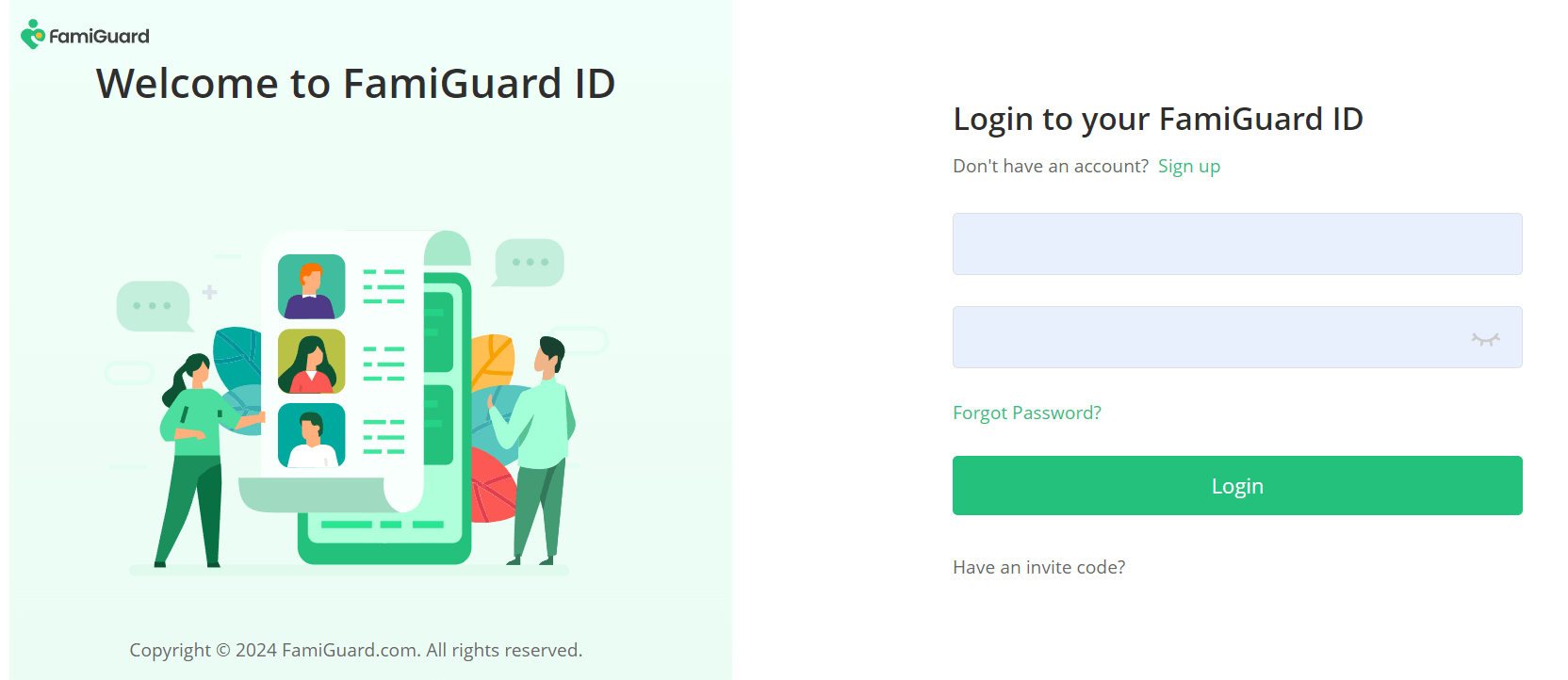
Step 2: Go to the Member Center page after setting up the target device. You can check My Product, My Account, or My Order here. View and manage the previously created order here. Next, select the Setup Guide option and carefully follow the instructions to set up the target device.
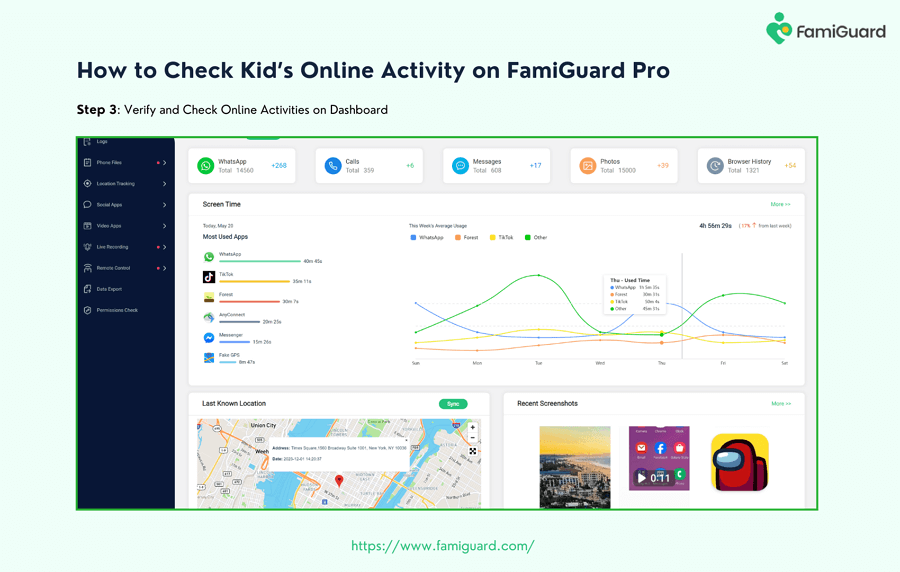
Step 3: To check your kid's online activities, click Dashboard and find the tracking option you want, such as the phone files, GPS locations, social apps, video apps, live recording, and remote control. Please be aware that the initial data synchronization from your phone to the Dashboard may take some time.

Conclusion
To summarize, good parenting means staying calm, clear and focused on the task. Knowing the ten things you should never say to your teenage child will help you have better conversations with her.
Parents significantly impact how their teens feel about themselves, so let them know you love them for who they are and are always there for them to talk about anything.
Furthermore, modern technology makes it easy for parents to monitor what their teens are doing online. To keep your young daughter safe online, we strongly suggest using FamiGuard Pro, an all-in-one parental control tool.

By Tata Davis
professional in software and app technology, skilled in blogging on internet
Thank you for your feedback!































